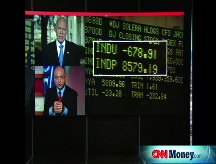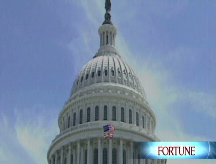All eyes turn to world leaders
As finance ministers of 7 largest economies meet, hopes rise that coordinated action will solve crisis.
NEW YORK (CNNMoney.com) -- The Federal Reserve and Treasury Department haven't been able to stop the panic gripping U.S. financial markets.
Neither have finance ministers and central bankers across the globe - from powers such as Britain and China to smaller countries such as Iceland.
In the face of the growing global crisis, can the Group of Seven and International Monetary Fund make a difference?
That's what the world is hoping. But even those calling for coordinated action on a global scale aren't sure they can.
The IMF and its sister organization the World Bank are holding their joint annual meeting in Washington, while the finance ministers of the world's leading industrialized nations, the G-7, are also set to meet in Washington this weekend. In addition, the G-20, the finance ministers and central bankers for a larger group of the world's top nations, will also meet.
With governments moving to pump billions into the troubled banking system, talk is brewing of the need for coordinated action to restore confidence and stability to markets.
"I hope the G-7 meeting will point toward coordinated actions to show that authorities are getting ahead of the curve," said Robert Zoellick, president of the World Bank, on Thursday. "Countries will take different actions, customized to their circumstances, yet the actions need to target the same basic problems."
That problem is a lack of confidence between financial institutions worried about their ability to safely trade and loan money to one another. The lack of confidence has caused a near global cut-off in credit needed to fund the day-to-day operations of business big and small around the world.
"The G-7 countries can work through this crisis by dealing with bad assets, recapitalizing banks, and providing much needed liquidity," said Zoellick. "They need to work together to fix the financial, regulatory, and supervisory system that failed."
But agreement on coordinated action will be difficult, and some experts question whether it's even the solution needed for plunging stock markets around the globe. They point out that coordinated emergency interest rate cuts by the major central banks around the globe on Wednesday did little to free up lending.
"I think we're dealing with more confidence than substance," said Kevin Giddis, head of fixed-income trading at Morgan Keegan. "We've done all of the rotations a couple of time, and it's clear that pure infusion of cash doesn't restore confidence."
Giddis is hoping the G-7 finance ministers will announce guarantees for all interbank lending, a move that he believes could break the crisis of confidence. He said the doubts about whether an agreement can be achieved continue to weigh on global financial markets.
"Whether's it's possible, I don't know," he said.
John Silvia, chief economist with Wachovia, said whatever programs the finance ministers might announce this weekend would probably take months if not years to directly affect the way global financial transactions take place.
"Do you think this is Yul Brynner and the Magnificent Seven? No," he said.
It's not even clear if the finance ministers have the power to announce something like an interbank lending guarantee without approval of their governments' legislative branches, Silvia noted. He said a simple commitment of the ministers to take coordinated steps in the future should help assure and calm investors.
But Silvia said the risk to financial markets is that the statement from the ministers will fall short of current hopes for pledges of unified action. He said a statement filled with platitudes and no concrete promises will likely shake investor confidence even further early next week.
"There needs to be a strong signal that they're moving forward together," said Silvia "To say we had a good meeting but we can't get it together, it'd be a very bad sign. Impotence is not an option."
The attention being given to the crisis is one reason many are expecting that the heads of states of the G-8 nations - the G-7 plus Russia - also may meet by early next week. Italian Prime Minister Silvio Berlusconi said Thursday that President Bush had proposed a summit of G-8 leaders in Washington next week. The White House denied Thursday that a meeting had been set, although it said the Bush administration is open to such a meeting.
In comments Friday morning on the financial crisis and this weekend's G-7 meeting, the president did not announce plans for a summit of G-8 leaders.
"I think the finance ministers can certainly do the job, but to send the strongest message, you need the biggest of the bigs involved," said Giddis. "How much carnage do you have to see to get everyone to the table?"
It's unclear what role the IMF can play in solving the global financial crisis.
The organization was formed near the end of World War II to promote international financial stability as a way of the kind of avoiding global economic hardship that helped cause that war. It is best known for loaning money to smaller economies facing economic crises, such as the collapse of their currency.
Swedish Central Bank Governor Stefan Ingves issued a statement Friday saying the IMF should play a central role in finding a solution.
"As we learn lessons from the financial turmoil and adapt the rules for the international financial system, we need to give the IMF with its analytical strength and universal membership a stronger role in promoting global financial stability," Ingves said. "At this juncture, the IMF should consider using its mandate to call for a multilateral consultation to develop a response to the ongoing financial crisis."
But others say that the IMF is better suited to deal with problems in smaller nations, those with small enough economies that an IMF loan program can make a difference. When the crisis hits economies the size of the United States, Europe and Japan, those critics say, the IMF can only offer limited help.
"The best they can do is play a supporting role," said Giddis. ![]()



